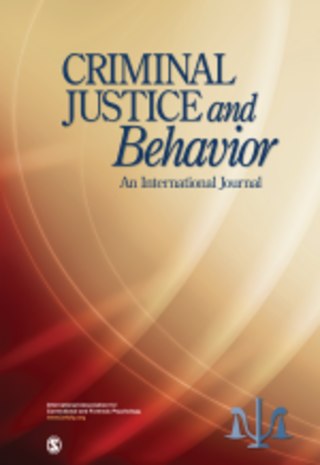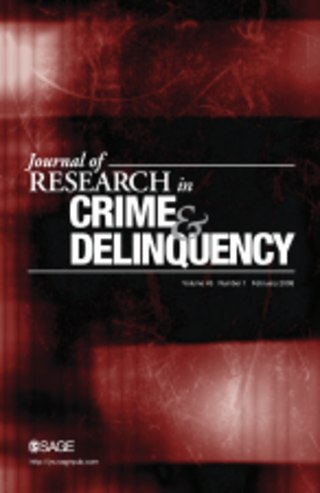
The feminist school of criminology is a school of criminology developed in the late 1960s and into the 1970s as a reaction to the general disregard and discrimination of women in the traditional study of crime. It is the view of the feminist school of criminology that a majority of criminological theories were developed through studies on male subjects and focused on male criminality, and that criminologists often would "add women and stir" rather than develop separate theories on female criminality.
The Australian Institute of Criminology (AIC) is Australia's national research and knowledge centre on crime and criminal justice. The Institute seeks to promote justice and reduce crime by undertaking and communicating evidence-based research to inform policy and practice.
British Society of Criminology (BSC) is a leading international organizations aiming to further the interests and knowledge of both scholars and practitioners involved in any aspect of professional activity, teaching, research or public education related to crime, criminal behaviour and criminal justice systems in the United Kingdom and abroad. BSC is dedicated to promoting criminology and criminological research. Its official, peer-reviewed, scholarly journal is called Criminology and Criminal Justice (CCJ) and is published through SAGE Publications.

Cultural criminology is a subfield in the study of crime that focuses on the ways in which the "dynamics of meaning underpin every process in criminal justice, including the definition of crime itself." In other words, cultural criminology seeks to understand crime through the context of culture and cultural processes. Rather than representing a conclusive paradigm per se, this particular form of criminological analysis interweaves a broad range of perspectives that share a sensitivity to “image, meaning, and representation” to evaluate the convergence of cultural and criminal processes.

Travis Warner Hirschi was an American sociologist and an emeritus professor of sociology at the University of Arizona. He helped to develop the modern version of the social control theory of crime and later the self-control theory of crime.
In criminology, the focal concerns theory, posited in 1962 by Walter B. Miller, attempts to explain the behavior of "members of adolescent street corner groups in lower class communities" as concern for six focal concerns: trouble, toughness, smartness, excitement, fate, autonomy. Miller described these focal concerns as "areas or issues which command widespread and persistent attention and a high degree of emotional involvement." Miller's theory, as it is often referred to, views these criminogenic influences as a learned part of the lower-class subculture values. In essence, the theory suggests that delinquency is in fact part of the learned cultural values rather than an anomic reaction to unattainable goals.
Crime and Delinquency is a peer-reviewed academic journal that publishes papers in the field of Criminology. The journal's editor is Paul E. Tracy. It has been in publication since 1955 and is currently published by SAGE Publications.

Criminal Justice and Behavior is a peer-reviewed academic journal that covers research in the fields of psychology and criminology. The editor-in-chief is Robert D. Morgan. It was established in 1974 and is currently published by SAGE Publications in association with the American Association for Correctional and Forensic Psychologists and the International Association for Correctional and Forensic Psychology.

Journal of Research in Crime and Delinquency is a peer-reviewed academic journal that publishes papers in the field of Criminology. The journal's editors Jean McGloin and Chris Sullivan. It has been in publication since 1964 and is currently published by SAGE Publications.
Shaun L. Gabbidon is a criminologist and the author of many articles and books that typically focus on the areas of racial and ethnic issues in criminology.

Police Quarterly is a peer-reviewed academic journal that publishes papers in the field of criminology, in particular theoretical contributions, essays, and empirical studies on issues related to policing. The journal's editor-in-chief is John L. Worrall. It was established in 1998 and is currently published by SAGE Publications on behalf of the Police Executive Research Forum and the Academy of Criminal Justice Sciences' Police section.

Youth Violence and Juvenile Justice is a quarterly peer-reviewed academic journal that covers the field of criminology and juvenile law. Its Co-editors are Chad R. Trulson and Jonathan W. Caudill. It was established in 2003 and is currently published by SAGE Publications.

Feminist Criminology is a peer-reviewed academic journal that covers the field of criminology, especially research and theory that highlights the gendered nature in areas such as girls and women as victims, feminist theories of crime, and girls and women and the justice system. The journal's editor-in-chief is Kristy Holtfreter. It was established in 2006 and is published by SAGE Publications in association with the Division on Women and Crime of the American Society of Criminology.

The Journal of Contemporary Criminal Justice is a quarterly peer-reviewed academic journal that covers the field of criminology. The editor-in-chief is Chris Eskridge. It was established in 1978 and is currently published by SAGE Publications.
Lee E. Ross is an African-American criminologist and author of articles and books that address issues of domestic violence and topics related to race, crime, and justice.
The Academy of Criminal Justice Sciences (ACJS) is an international association established in 1963 to foster professional and scholarly activities in the field of criminal justice and criminology. ACJS promotes criminal justice and criminology education, policy analysis, and research for scholars, practitioners, and policymakers. Its national office is located in Greenbelt, Maryland, a suburb of Washington, D.C., in the US.
David Philip Farrington is a British criminologist, forensic psychologist, and emeritus professor of psychological criminology at the University of Cambridge, where he is also a Leverhulme Trust Emeritus Fellow. In 2014, Paul Hawkins and Bitna Kim wrote that Farrington "is considered one of the leading psychologists and main contributors to the field of criminology in recent years."
Daniel Preston Mears is an American criminologist, a Fellow of the American Society of Criminology, and the Mark C. Stafford Professor of Criminology at the Florida State University College of Criminology & Criminal Justice. A 2011 ranking of American criminologists ranked Mears as the second most influential in terms of scholarly contributions. His research interests include the study of supermax prisons, immigration and crime, causes of offending, sentencing, and juvenile and criminal justice policy. He is the author of American Criminal Justice Policy: An Evaluation Approach to Increasing Accountability and Effectiveness, Prisoner Reentry in the Era of Mass Incarceration, Out-of-Control Criminal Justice: The Systems Improvement Solution for More Safety, Justice, Accountability, and Efficiency, and Fundamentals of Criminological and Criminal Justice Inquiry.

Richard T. Wright is an American criminologist. He is Board of Regent's Professor of Criminal Justice and Criminology at Georgia State University (GSU) in the Andrew Young School of Policy Studies. He served as Chair of the Department of Criminal Justice and Criminology at GSU from 2014–2018, and was elected a Fellow of the American Society of Criminology in 2009.

Anarchist criminology is a school of thought in criminology that draws on influences and insights from anarchist theory and practice. Building on insights from anarchist theorists including Pierre-Joseph Proudhon and Peter Kropotkin, anarchist criminologists' approach to the causes of crime emphasises what they argue are the harmful effects of the state. Anarchist criminologists, a number of whom have produced work in the field since the 1970s, have critiqued the political underpinnings of criminology and emphasised the political significance of forms of crime not ordinarily considered to be political. Anarchists propose the abolition of the state; accordingly, anarchist criminologists tend to argue in favour of forms of non-state justice. The principles and arguments of anarchist criminology share certain features with those of Marxist criminology, critical criminology and other schools of thought within the discipline, while also differing in certain respects.










